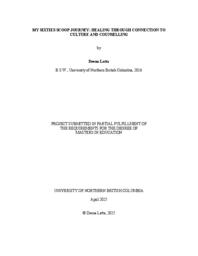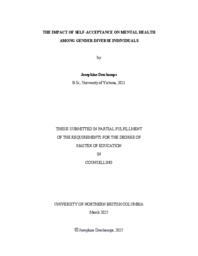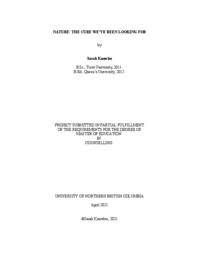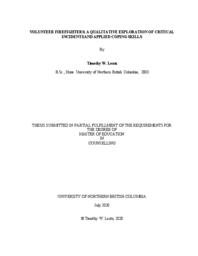University of Northern British Columbia. Education-Counselling
Related Works
Content type
Digital Document
Description / Synopsis
This project presents a comprehensive facilitator manual designed to support new counsellors
entering the field of family counselling. Grounded in systemic theory, ethical practice, and
cultural humility, the manual bridges the gap between academic preparation and the complex
realities of clinical work with families. Drawing on an extensive literature review, the manual
offers practical tools, theoretical frameworks, and reflective prompts to help emerging
practitioners navigate common challenges such as family dynamics, communication
breakdowns, dual relationships, and therapeutic impasses. Particular attention is given to the role
of counsellor positionality, cultural responsiveness, and the unique demands faced by new family
counsellors. Developed through a self-directed and iterative process informed by the author’s
clinical and academic experience, the manual serves as both a practical resource and a reflective
guide, aiming to foster confidence, competence, and ethical engagement in early-career family
counsellors.
Origin Information
Content type
Digital Document
Description / Synopsis
During my time at the University of Northern British Columbia, I have learned that children do
not communicate through words because the speaking part of the brain takes time to fully
develop. When it comes to counselling children, actions, such as those from creative arts
therapies, can benefit children more than talking. Among these actions are dance movement
therapy interventions, some of which use proprioceptive, exteroceptive, and interoceptive
strategies. This project aims to give counsellors, particularly child and youth counsellors who are
new to dance movement therapy, a starting point for bringing dance movement therapy into their
work. It acts as a guidebook that explains the purpose of using dance movement therapy in a
counselling setting and how to do this safely. It lists specific interventions and the intentions
behind them, and it finishes with listing where to get further training.
Origin Information
Content type
Digital Document
Description / Synopsis
none available
Origin Information
Content type
Digital Document
Description / Synopsis
Sub-Saharan African migrants often experience unique mental health challenges
shaped by the complex interplay of migration, cultural identity, systemic barriers, and
historical trauma. These experiences are frequently misunderstood or overlooked within
dominant Western counselling frameworks. This project examines the mental health needs of
Sub-Saharan African migrants living in Canada through a culturally safe counselling lens.
Grounded in literature and critical theory, the project emphasizes the importance of culturally
responsive, anti-oppressive, and strengths-based approaches in therapeutic practice. The final
deliverable, a practitioner-focused handbook, provides guidance for counsellors seeking to
engage more effectively with Sub-Saharan African clients. The handbook includes culturally
grounded adapted Western therapeutic approaches, reflections on power and identity, and
tools for integrating spiritual, communal, and contextual elements into care, with the goal of
fostering more inclusive and affirming mental health support for sub-Saharan Africans in
Canada.
Origin Information
Content type
Digital Document
Origin Information
Content type
Digital Document
Description / Synopsis
The following is a synthesis of the literature focused on ways of supporting healthy grieving in children and a related children’s book based on the findings. I have produced a book on grieving that is intended to be used by caregivers and educators to support bereaved children. The support strategies that are discussed here and reflected in the book Dragonfly Dance include ideas from traditional therapeutic approaches, expressive arts, pet therapy, grief camps, adventure therapy, and group therapy. The tasks of grieving are also described through selected literature. Dragonfly Dance incorporates many of the known activities that support transition through grief.
Origin Information
Content type
Digital Document
Description / Synopsis
This project will examine the emerging literature related to the coronavirus disease pandemic, its potential effects on the mental health of children and factors promoting resilience in this population. The culmination of this work will be a series of interventions utilizing bibliotherapy to help foster resilience in children. These interventions are intended to be used by school counsellors, mental health professionals, teachers or parents, as well as with small groups or large groups of children. The project will be divided into five sections with each section focusing on a principle that helps promote resilience in children following a mass trauma. Each section will consist of an explanation of the principle, a book choice, interventions that could be initiated by a mental health professional, a teacher, or a parent followed by an annotated bibliography of additional books that could be utilized to support this principle.
Origin Information
Content type
Digital Document
Description / Synopsis
Nature-based therapy is a therapeutic lens that utilizes nature as a co-therapist. This approach addresses the disconnect between land and people, a disconnect that negatively impacts the mental health of many of those seeking mental health services. Consequently, this approach is now considered an effective treatment for youth and is used as a standalone approach or integrated with cognitive behavioural therapy, gestalt, or group therapy. In either case, this nature-based lens provides a bridge between traditional Indigenous practices and Western psychology. My project highlights various activities and ideas in order to incorporate nature into one’s practice as a therapist, specifically within a northern context. Information regarding benefits, ethical concerns and various types of nature-based therapy will be discussed and guide the development of the manual. The guidebook will assist those interested in nature therapy by creating a place where tangible and realistic ideas for how to incorporate it into practice are located.
Origin Information
Content type
Digital Document
Description / Synopsis
Difficulties in mentalization may be a developmentally based foundation for interpersonal problems in Borderline Personality Disorder (BPD). Fonagy and colleagues have developed a theoretical framework whereby relationships between difficulties in mentalization and other core characteristics of BPD (i.e., insecure attachment, intrapersonal emotion dysregulation and identity diffusion) may underlie interpersonal problems. However, most of the published work on these aspects of the framework have been theoretical in nature. The aim of the study was to investigate this framework and extend it by including interpersonal emotion dysregulation. Simple and multiple mediation analyses were performed with a convenience sample of 64 undergraduate students. Results indicated that hypomentalizing mediated the relationship between BPD symptoms and interpersonal problems. No significant mediators were found between insecure attachment and interpersonal problems or between mentalization errors and interpersonal problems. Limitations include the sample size and the lack of a negative emotion induction and recommendations for future research are suggested.
Origin Information
Content type
Digital Document
Description / Synopsis
Volunteer firefighters have limited up-to-date training and awareness in applied coping skills and trauma informed practice (TIP). Critical Incident Stress Management (CISM) has been a standard of practice within emergency services — including fire rescue services — for decades in Northern British Columbia. With new developments in TIP, I suggest we can further improve volunteer firefighters’ wellness by exploring specific coping strategies. The purpose of this endeavour was to interview volunteer firefighters, explore their experiences, and better understand their coping styles and approaches to managing stress related to the work. In the exploration of critical incident coping skills, a qualitative methodology and thematic analysis was applied. This study adds to the current literature on work-related coping, and hopefully increases awareness of best practices for psychological safety and wellness of volunteer firefighters in Northern British Columbia.
Origin Information










